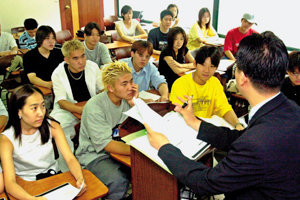
강남의 한 외국어학원에서 학생들이 SAT 강의를 듣고 있다.
다른 사람들의 의견에 대해 지나치게 염려하면 우리는 그 본질을 명확하게 볼 수 없는가? 이 문제에 대해 당신의 의견을 담은 에세이를 쓰시오. 독서, 학습, 경험 또는 관찰을 통해 얻은 추론과 사례를 가지고 당신의 생각을 뒷받침하시오. -SAT Essay
[학생 작문] I strongly believe that worrying too much about other people’s opinions not only [1] prevent us from seeing things clearly, but also [2] may give a false interpretation of other people’s opinions. One can never continue to develop if he or she is constantly worried about [3] others’ criticisms.
Many people tend to be affected greatly by what others think of them. Although some [4] criticisms [5] intended for better improvement are beneficial, harsh comments [6] intended to defame are unpleasant and have [7] negative impacts. However, it is evident that [8] many people just do not like to see others [9] do better than them. [10] So, they make themselves feel better [11] not by trying to improve to be better and have a fair competition, but by bringing them down by making false or exaggerated comments of others. [12] So many people [13] exposed to harsh criticisms tend to lose their self-confidence and perform worse than before. They [14] become hypnotized and brainwashed of their ability and capability and so they underestimate themselves after being [15] affected by the criticisms.
On the other hand, if one is exposed [16] of too much support and exaggerated encouragements, one [17] tends to overestimate [18] his ability and become arrogant. For example, young athletes who are constantly praised by the media become so arrogant that they lose the passion for the sport because they think they are and [19] will be better than others. However, some athletes who are [20] prejudiced and criticize by the public [21] quit the sport for they think they are too bad for the sport; [22] they also lose the passion for the sport they had in the beginning. Thus, by [23] worrying too much [24] about other people’s opinions, whether positive or negative, [25] prevents from seeing their [26] ability or capability clearly.
Many successful [27] ones all have something in common; they [28] are never affected greatly by criticisms. For [29] another instance, some athletes who never [30] lost sight of their passion eventually [31] became great. Steve Nash, [32] for one, is a great example. He only received one scholarship offer from a college during his early career. However, no matter what others said about him, whether it was [33] his short physique or [34] his nationality that did not produce a lot of basketball stars, he was never greatly affected by [35] other opinions. Thus, he [36] achieves his goal [37] eventually by receiving the most valuable player [38] [39] in the 2004-05 NBA season. [40] For another example, two young unknown computer engineers [41] started a business with an extraordinary item in their garage [42], and many [43] believe their business to be [44] pathetic and wasteful of time. Although they also knew that their chance of success was low, they were never greatly affected by [45] the outsiders’ opinions. They knew exactly what they were capable of and they continued their business idea. [46] So, they eventually succeeded by offering a completely different computer system, [47] which now is know ‘Apple computers’.
Steve Nash and the two CEOs of Apple are the opposites of those who are blinded by others’ opinions and criticisms. [48] The successful ones were never greatly affected by criticisms [49] which gave them more time to self-develop and succeed. Although [50] taking account of some [51] criticisms can [52] give a push for more improvement, [53] worrying about too much criticisms can hold back from more improvement.
|
COMMENT : Overall, this essay is very well done. You’ve organized it nicely. I really liked your conclusion this time. This biggest problem (which every Korean who is learning how to write has) is your non-idiomatic expressions. These can be some of the hardest things for you to improve.‘Non-idiomatic expressions’ refer to phrases or sentences which a native speaker understands but wouldn’t express in the same way. They are ‘unnatural sounding’. Keep doing lots of reading and practice and you will improve in time. You still began a couple of your sentences with coordinating conjunctions in this essay. You must edit your own work for these. I know they are okay in speaking and informal writing, but they are not in formal writing. For example,
So, they make themselves feel better not by trying to improve to be better and have a fair competition, but by bringing them down by making false or exaggerated comments of others. So many people exposed to harsh criticisms tend to lose their self-confidence and perform worse than before.
See how you began these sentences with ‘so’. You need a transition word here instead like ‘as a result’ or ‘therefore’.
Finally, be careful when you are using phrasal verbs. Make sure that you are using the right preposition or adverb with the verb. For example:
On the other hand, if one is exposed of too much support and exaggerated encouragement, one may tend to overestimate his or her ability and become arrogant.
In this sentence, you wrote ‘exposed of’. However, it should be ‘exposed to’.
전반적으로 잘 쓴 에세이입니다. 구성이 좋습니다. 특히 마지막 결론 부분이 마음에 듭니다. 그러나 가장 큰 문제는 관용적 표현이 적다는 것입니다. 이는 많은 한국인들이 영작할 때 드러내는 단점 중 하나입니다. 이 부분을 향상시키는 것은 결코 쉽지 않습니다.
그러나 원어민들은 비관용적 표현을 이해는 하지만 잘 사용하지 않습니다. 그리고 부자연스럽다고 생각합니다. 이를 개선하기 위해서는 독서를 많이 하고, 의식적으로 관용어구를 많이 쓰도록 노력해야 합니다.
또한 이 에세이에는 몇몇 문장이 ‘so’ 같은 등위접속사로 시작됩니다. 물론 말할 때나 비교적 사적인 글에서는 가능합니다. 그러나 공식적인 글에서는 통용이 안 됩니다. ‘so’ 대신 ‘as a result’ 또는 ‘therefore’ 같은 연결어가 더 정확합니다.
마지막으로 동사구를 사용할 때는 조심해야 합니다. 동사와 붙어 다니는 적절한 전치사와 부사를 사용하는 데 유념하도록 합니다. 위에서 ‘exposed of’로 썼는데, 이는 ‘exposed to’가 맞습니다.













![[영상] “우리 인구의 20% 차지하는 70년대생, 은퇴 준비 발등의 불”](https://dimg.donga.com/a/570/380/95/1/carriage/MAGAZINE/images/weekly_main_top/6949de1604b5d2738e25.jpg)
![[영상] 폰을 ‘두 번’ 펼치니 ‘태블릿’이 됐습니다](https://dimg.donga.com/a/380/253/95/1/ugc/CDB/WEEKLY/Article/69/48/a9/23/6948a9231242a0a0a0a.png)

